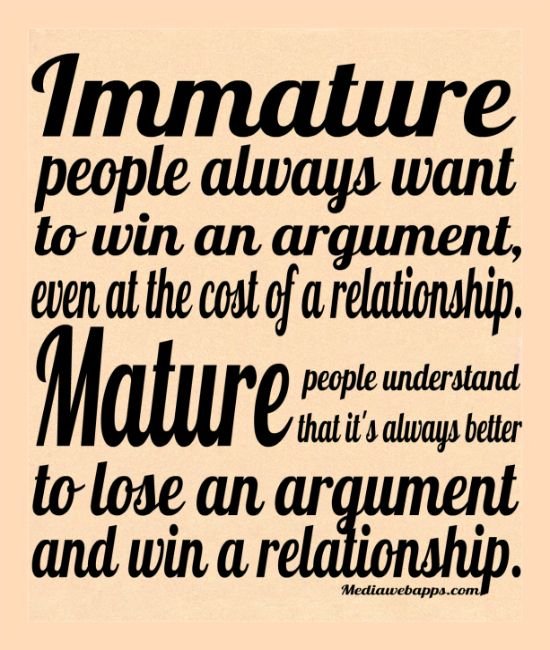How Far Have We Understood Argument?
How Far Have We Understood Argument?

Image Source
The word argument has a few implications, so our first errand is to clear up each and take note of how it varies from the others. One normal significance is a quarrel, as in the sentence "They had a warmed argument, a genuine shouting match." Because a quarrel comprises less of thought than of emotion, a conflict of egos that much of the time savages into careless jibber jabber, this meaning of argument has little pertinence to critical thinking.
Another significance of argument is the trading of feelings between at least two individuals, as happens in a formal debate. In this feeling of the term, an argument is in a perfect world a helpful attempt in which individuals with various viewpoints cooperate to accomplish a more profound, more precise, understanding of an issue. In such an attempt egos are controlled and everybody, however needing to be correct, will be demonstrated off-base. Since everybody rises up out of the procedure with more prominent understanding, nobody loses.
Egos are not effortlessly stifled. In addition, a large portion of us have been conditioned to accept there must be a victor and a failure in each argument, similarly as in each athletic challenge. Along these lines we frequently concentrate more on scoring points against our opponent than on developing in knowledge and intelligence, so even our earnest attempts tend to miss the mark regarding the perfect. In spite of the fact that argument as the trading of feelings between at least two individuals is pertinent to critical thinking, another significance of the term is significantly more applicable to the test of turning into a critical thinker.
Argument, in this sense, implies the line of reasoning that backings a judgment. When we say, "John's argument on the issue of the death penalty was more influential than Sally," we are concentrating on the nature of his individual commitment to the general thought.
Like numerical equations, arguments might be mind boggling and also straightforward. Similarly as the total in a numerical equation might be made out of many numbers, so the conclusion of an argument may continue from many premises. And similarly as having an off base number in a segment of figures will bring about a wrong total, so having an off base statement will prompt a wrong conclusion.
The field of knowledge most nearly connected with the investigation of argument is logic, which, as different fields that arrangement with complex issues, has its own particular special terminology. Since we are more on handy than hypothetical, we will confine our worry to those terms that mean the parts of an argument: the premises and the conclusion. In the argument about Sylvia the teacher, the premises are "The law forbids teachers from driving class supplications in state funded schools" and "Sylvia drives understudies in petition in her government funded school classroom." The conclusion is "Subsequently, Sylvia is infringing upon the law."

Image Source
Principles in evaluating arguments:
The premises are either valid or false.
The reasoning that connections the premises to the conclusion is either substantial or invalid.
Correct premises in addition to substantial reasoning equivalent a sound argument.
Either an off base preface or invalid reasoning will render an argument unsound.
Oversights are as normal in logical thinking as they are in arithmetic. This is genuine of other individuals' thinking as well as of our own also. Similarly as we can have precise numbers and do our best to include painstakingly yet concoct the wrong answer, along these lines, as well, would we be able to continue from exact data to a wrong conclusion. Obviously, when we begin with incorrect or deficient data or reason carelessly, the odds of blunder are exacerbated.
Wrong states of mind toward thoughts and the reasoning procedure can likewise prompt blunders in argument. For instance, on the off chance that you see your initial introductions as reliable, you are probably going to grasp them uncritically, search out proof that backings them and reject prove that difficulties them, and guard them violently. Such an approach abandons you helpless both to self-trickery and to control by others. Conversely, in the event that you view your early introductions probably as intriguing conceivable outcomes as opposed to assurances and contrast them with different thoughts before deciding, you are more averse to trick yourself or be deluded by others.

Image Source

Argument is the biggest reason of differences and distance between relationships.
Put pride in arguments and you will loss the sense!😂🐝
An argument to me is an irrational conversation where the topic becomes personal and sways away from the question at hand. A discussion leads to a solution, whereas an argument leads toward animosity.
How about healthy argument, is it possible?
I would say that is a discussion.
I love a good debate/ discussion (I always have) but through the years I've learned that the true mark of maturity lies in being able to see and admit you were wrong and not for the sake of the relationship but out of gratitude for the shift in perspective and the ability to see things in a light that was previously shut off to you in some way. I have made it a habit to thank those who prove me wrong because without them... I'd never evolve and that's a sad existence. Just my opinion on the matter. Thanks for sharing,
I'll gladly resteemed and uplike
please help me out the same. Thank you and many blessings.